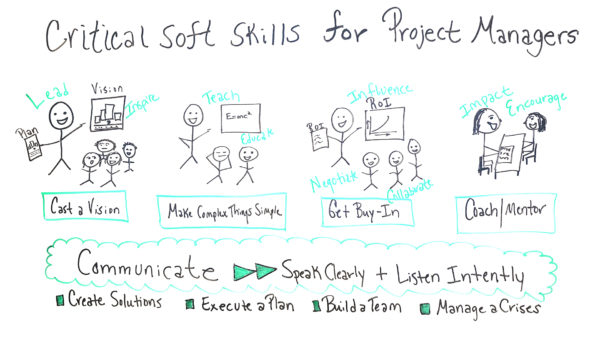What are soft skills and why do project managers need them to lead a project to a successful end? All those questions and more are answered by Jennifer Bridges, PMP, in this project management training video.
Here’s a screenshot of the whiteboard for your reference.

In Review – Critical Soft Skills for Project Managers
The skills required of project managers are many. Jennifer noted that she’s done several whiteboard sessions on technical, behavioral and other skills needed to run a successful project.
For this video, she focused on soft skills. She said some consider soft skills the hard skills because they’re not as concrete. Soft skills mean understanding different thinking styles and being able to get a diverse group to work together towards a common goal.
Related: Hard Skills vs Soft Skills: Understanding the Benefits of Both
Soft skills help a project manager cast a vision for the project. It’s a key aspect of leadership that every project manager must have to inspire their team. This often includes being able to make the complex easy to understand across a spectrum of different types of team members.
Therefore, a project manager must be able to teach their teams in order to understand the project and what their part is in it. Through this, they can achieve buy-in from the team, which is essential to getting the work done right.
In order to do this, project managers must be mentors and coaches, chaperoning team members through aspects of the job that might not align with their skill sets but are still necessary for them to work together. Facilitating collaboration is another initiative the project manager is responsible for leading.
Related: Using DACI Framework for Better Group Decisions
Being able to deal with the logistics and technical aspects of a project are but two of three pillars that support a well-rounded project manager. There are times when personalities and emotions must be dealt with in a project. That’s where the soft skills come in. Like everything else with project management, dig deep enough and you’ll find the common thread of communications. A project manager who speaks clearly and listens intently is one who will excel. Learn more by reading our 7 secrets for effective team communication.
Pro-Tip: Speaking of soft skills, there is also soft power negotiations. Project managers are always negotiating with everyone, from teams to stakeholders to vendors and more. In a nutshell, you catch more flies with honey than with vinegar.
Take it Further: All project managers must lead. Further, hone your soft skills by identifying which leadership theory works best for you.
Thanks for watching!
Transcription
Today, we’re talking about critical soft skills for project managers. Well, in some of our previous whiteboard sessions, we’ve talked about the technical skills for project managers. We’ve also talked about behaviors or other qualities of project managers. But in today’s whiteboard session, I want to focus on the soft skills.
Well, sometimes we say the soft skills are the hard skills. Well, why is that? Because when we talk about soft skills, we’re typically talking about human-to-human interaction. We have to consider things like different thinking styles, different perspectives, and trying to get people on a team to think commonly and drive results.
So why is this so important? We’ve seen the soft skills is where a project can ultimately fail or succeed. So let’s talk about some of the soft skills.
Well, as a project manager, it’s very important to be able to cast a vision for the team. Let them know where are we going, why are we even going, and ultimately, how are we going to get there, what’s our blueprint. And through that, the project manager needs to be able to lead the team.
They need to be able to inspire them, sometimes during some difficult circumstances. They also need to be able to make complex things simple, whether it’s topics or plans or maybe even some negotiating between different groups.
So through that, they may be able to teach, educate, or deliver different types of information. So they also need to be able to get buy-in, sometimes from stakeholders, the executive teams, other team members, and even sometimes vendor partners.
And because of that, they need to be able to influence others, they need to be able to collaborate effectively, and they also need to be able to negotiate.
They also need to be able to coach and mentor different members of the team, and through that, they need to be able to impact them and encourage them sometimes in getting through some fears or maybe some things they’ve never done before.
So the common thread between all of these is communication. So being able to communicate is a very critical soft skill, being able to speak clearly and listen intently.
So when we speak clearly is being able to deliver a clear and concise message for the team, being able to do that for people with different thinking styles, people with different perspectives.
Also, being able to listen intently, being able to ask some of the right questions and listen to what the person is saying, and more importantly sometimes is listen for what they’re not saying.
So as a project manager, through all of these skills is being able to create solutions, being able to execute a plan to get results, build a team, and sometimes manage a crisis. So if you need additional resources for soft skills, then sign up for our software now at ProjectManager.

